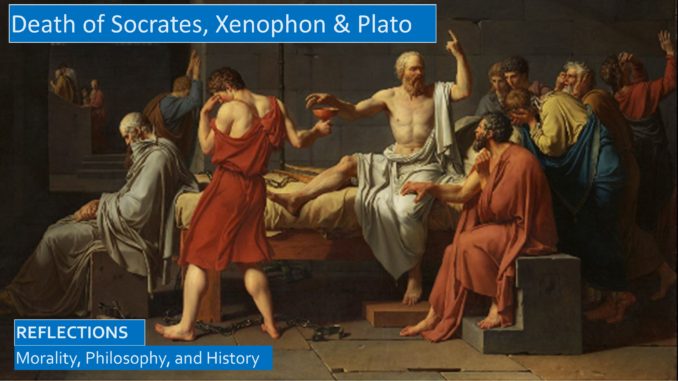
Why did the Athenians vote to convict Socrates for corrupting the youth of Athens? Why did the Athenians then vote to execute Socrates?
Many modern Christians like to compare Socrates to Jesus, so a similar question might be asked, Why did the Jews choose to execute Jesus rather than the rebel Barabbas?
We must be careful when making such comparisons, we should not judge Socrates solely according to the criteria of, What would Jesus do? Simply put, Socrates was not Jesus. But we can compare and contrast Socrates to Jesus, not seeking to condemn Socrates but to increase in our hearts our love for our neighbor, and to gain wisdom, to seek to live the examined life, for Socrates was right in asserting that an examined life is not worth living.
Platonic philosophy is seen as the basis of Western Philosophy, which is often described as mere footnotes to Plato. But we must not forget that the Socratic dialogues penned by Plato are written for a peculiar political culture and for a peculiar historical time.
When we converted our blogs on the trial and execution of Socrates, our thinking evolved, please view a later blog on this topic:
http://www.seekingvirtueandwisdom.com/pondering-the-death-of-socrates-in-xenophon-plato-and-aristophanes/
Please view our YouTube video at: https://youtu.be/Mip1vgRKH1E
That peculiar political culture is the pure democracy of Athens, where every free male citizen not only had a vote in the Assembly but public trials like that of Socrates would have a five hundred and one person jury. These were not like modern trials, in ancient Athens there were no grand juries, there were no lawyers, all defendants had to argue their own case, there were no rules of evidence, no rules of procedure guaranteeing the fairness of the trials, the defense and prosecution got to speak until the water in the water clock ran out. Then the jurors vote, and if the defendant is found guilty he is allowed time to suggest an appropriate sentence, and the jurors voted a second time to determine the sentence.
In today’s trials the judge very carefully informs the jurors what law and precedent has determined what is just and what is justice in this particular case, and what needs to be proved to determine that the defendant is indeed guilty, and what is irrelevant. Substituting for this in ancient Athens were teachers like Socrates who taught the citizens how to think logically, how to puzzle through questions of justice and virtue, right and wrong, when they served as jurors in the courts and as legislators in the Assembly.
The peculiar time of the Socratic dialogues was the period after Athens lost the Peloponnesian War to Sparta. After their defeat the Athenians were expecting the fate that faced most losing sides in the ancient world, the women and children would be enslaved and deported, and the men would either be slain or enslaved in the silver mines or other short-lived work. But the Spartan general Lysander spared Athens, tearing down its walls, permitting the city a handful of trireme warships, and installing the pro-Spartan oligarchy of Thirty Tyrants. One of these tyrants was Critias, a former student of Socrates.
After a few years the Athenians overthrew the Thirty Tyrants and reestablished a democracy, but politically they were deeply insecure, they were looking for scapegoats, and Socrates was a good scapegoat. This was not a good time to be a gadfly. The Athenians did not want to look into themselves to find who was at fault. Several of his former students were deemed responsible for the Athenian defeat in the war, including the irrepressible Alcibiades, who is an unsympathetic character in the Symposium dialogue. Alcibiades committed acts of hubris in spades, but he was by far the most talented general of the war, and if the Athenians had been consistent in their support of his command, he might have won the war for them.
In the Teaching Company lectures on the Platonic Dialogues Professor Sugrue argues that Plato portrays Socrates as the new and improved Homeric hero, a hero who instead of struggling on the battlefield instead struggles spiritually in his soul. This is an excellent analogy, except that Professor Sugrue does not carry through the analogy to its logical conclusion. The heroes of all the Homeric epics are guilty of acts of hubris, of arrogant overreach. We are encouraged to think for ourselves in the Socratic dialogues. Indeed, the dialogues themselves are a commentary on how few strive to think for themselves as they portray Socrates trapping his unfortunate interlocuters in moral and logical quandaries that demonstrate how little they ponder life’s trusts, but then the commentators fall into the same trap as these interlocuters when they fail to search for hubris on the part of Socrates.[1]
Another of the Great Courses lecture series on Ancient Greek Civilization by Professor McInerney agrees with my proposition that Socrates may have been executed because he inadequately prepared for his trial and he needlessly stirred up the jurors.[2]
In the Apology Socrates reads the affidavit accusing him, “it says Socrates is an evil-doer who corrupts the youth, who does not believe in the gods of the state, but has other new divinities of his own.” He questions Meletus who has brought up the charges, and in short order demolishes the charges, showing that they prove only that Meletus wishes him harm by bringing false charges. Meletus admits that Socrates believes in divine agency, which means he must believe in the gods.
Socrates earlier summarizes the affidavit differently, he asks, “what do the slanderers say? Socrates is an evil-doer and meddlesome, who pries into matters under the earth and in heaven, making the worse appear better,” teaching flawed doctrines. Socrates admits he is a bit of a gadfly, and asserts that is the role appointed to him by the gods, to be the gadfly of Athens, to be its conscience, for the force the citizens to ponder on the nature of justice and virtue so they can be better citizens of the polis.
Socrates opens his defense by noting how his friend asked the Oracle at Delphi whether there was any man wiser man than Socrates, and the priestess answered that that was no wiser man. Socrates asks, “Why do I mention this? Because I am going to explain to you why I have such an evil reputation. When I heard this, I said to myself, What can the god mean? How shall we interpret this riddle? For I know I have no wisdom, small or great. What then the he mean when he says that I am the wisest of men? And yet he is a god, and cannot lie, that would be against his nature.”
So Socrates describes how he wanders the streets of Athens searching for the wise man. He encounters a politician convinced of his wisdom, and Socrates recalls, “when I began to talk to him, I could not help thinking that he was not really wise, although he was thought wise by many, AND STILL WISER BY HIMSELF; and I tried (to be helpful) by explaining to him that he thought himself wise, but was not really wise; and the consequence was that he hated me, and his anger and enmity was shared by several who heard our conversation. So I left him, saying to myself, as I went away: Although I do not suppose that either of us knows anything really beautiful and good, I am better off than he is, for he knows nothing, and thinks that he knows; but I neither know nor think that I know.”
This sounds a little like the joke about elevators keep getting stuck on the floors in the Vatican as the priests keep going back and forth, “Please, you go first,” “No, you go first,” “No, you go first,” because they each know they are the humblest.
This Delphic Oracle may not have rung true to the Athenian jurors, it was just not enough of a riddle. Sometimes the oracle gave clear answers, when the Persians were invading Greece the Athenians asked what they should do. FLEE, you are doomed, the oracle warned. But Athens asked for a second oracle and one was uttered: Trust in your wooden wall. The Athenians puzzled over this, and they evacuated the women and children of Athens to a neighboring island while the men fought the Persians in their fleet of triremes, winning against all odds.
Socrates says he ponders the riddle of the oracle, as the oracles are always riddles, often vague, but answering NO to a question is not a riddle at all. Then Socrates begins to puzzle as to why he is the wisest of men, he doesn’t think so, but he must be wise, because the gods insist, so Socrates must really be the wisest of men, as least he is arguing so. Jesus may be humble, but Socrates is not humble, that is where he commits hubris.
Socrates lost his argument before he began with this beginning, this account brings to mind the modern saying that only the fool represents himself in court, except that Socrates had no choice, that was how the legal system worked back then. Many jurors probably plugged their ears with wax and heard nothing further, which is a shame, for the rest of the dialogue is a good argument.
Socrates would have done better to compliment the Athenians on their democracy, but to remind them how it is their duty to make their democracy excellent by learning how to make wise decisions, how to ponder the issues and judicial cases brought before them, how to ferret out the truth through the questions and responses of the dialectic, the Socratic dialogue, and he could have used the foolish decisions of past Assemblies that lost the last war, and the wise decisions that saved the Athenians and all of Greece from the tyranny of the Persians.
Socrates should not have started his further arguments with, “The man is the wisest, who, like Socrates, knows that his wisdom is in truth worth nothing. And so I go about the world,” irritating all of Athens with my humble Socratic inquisitioning.
Rather, “The truly wise knows that his wisdom is in truth worth nothing. The truly wise goes about the world, obedient to the god, searching and enquiring into the wisdom of anyone, whether citizen or stranger, who appears to be wise; and if he is not wise,” then you can humbly have him realize his error in judgement, but we lose the quotes here, because Socrates really said, “if he is not wise, then in vindication of the oracle I show him that he is not wise.” That may be the strategy, but the challenge is to encourage your neighbor to realize his errors and mature in his wisdom on his own, without you preaching to him.[3]
How do you encourage your neighbor to grow in wisdom without preaching to him? The Platonic method is the dialectic, the Socratic Dialogue, questions and answers to encourage the citizen to think. The method used by the Gospels is the parable, similar in function to the Delphic Oracle, that also entices the listener to think through questions of right and wrong, justice and virtue. Plato does not use parables as often, but he does use parables very effectively, the most famous parable in the history of philosophy is his Allegory of the Cave in the Republic.
Sometimes when pondering the intellectually challenging questions of philosophy and theology you sometimes just need to take a break, step back, and ask yourself, Is salvation possible without glasses?
Just like the dialectic often fails in the Socratic dialogues, so parables can often fail, often we just don’t get it. For example, we have the parable of the Pharisee and the Publican:
Jesus also told this parable to some who trusted in themselves that they were righteous and regarded others with contempt: “Two men went up to the temple to pray, one a Pharisee and the other a tax collector. The Pharisee, standing by himself, was praying thus, ‘God, I thank you that I am not like other people: thieves, rogues, adulterers, or even like this tax collector. I fast twice a week; I give a tenth of all my income.’ But the tax collector, standing far off, would not even look up to heaven, but was beating his breast and saying, ‘God, be merciful to me, a sinner!’ I tell you, this man went down to his home justified rather than the other; for all who exalt themselves will be humbled, but all who humble themselves will be exalted.”[4]
Most who hear this parable in Church on Sunday mornings rejoice that they are not one of those nasty Pharisees, that they rather are like the repentant publican. This reminds of the old riddle, What is the difference between those who go to church on Sunday and those who goes to the beach on Sundays? The answer is the people who go to the beach on Sundays don’t need to go to church because they don’t need to change, while the people who go to church on Sundays don’t need to change because they go to church. The Pharisees are those who go to church on Sunday, while the publicans are like the alcoholics who are the most likely to help other alcoholics because they are all alcoholics.
What is often lost is the real meaning of the parable to those who hear the parable at church, the meaning that is the most unsettling, that WE ARE THE PHARISEES.
Socrates responds to those who question why he pursues a course that may result in his untimely death, “a good man ought not to calculate the chance of living or dying, he ought only to consider whether he is doing right or wrong, acting the part of a good man or of a bad one.” Socrates compares his plight to Achilles in the Iliad, who chose death in battle to the dishonor of slinking away to live a long life in peace. “God orders me to fulfil the philosopher’s mission of searching into myself and other men, and if I were to desert my post through fear of death, I might justly be arraigned in court for denying the existence of the gods.”[5]
Socrates Blog 2 http://www.seekingvirtueandwisdom.com/sentencing-and-execution-of-socrates-in-apology-and-crito-blog-2/
[1] Michael Sugrue, “Tragedy in the Philosophic Age of the Greeks,” Lecture 4, in Plato, Socrates, and the Dialogues, lectures recorded by The Great Courses, (www.thegreatcourses.com, 2008)
[2] Jeremy McInerney, “Socrates On Trial,” Lecture 21, in Ancient Greek Civilization, lectures recorded by The Great Courses, (www.thegreatcourses.com, 2008)
[3] Plato, “Apology of Socrates,” in the Essential Dialogues of Plato, translated by Benjamin Jowett (New York: Barnes and Nobles Classics, 2005, first published 1871), pp. 275-287.
[4] https://www.biblegateway.com/passage/?search=luke+18%3A9-14&version=NRSVCE
[5] Plato, “Apology of Socrates,” p. 287.

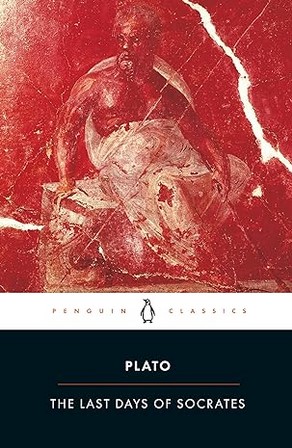
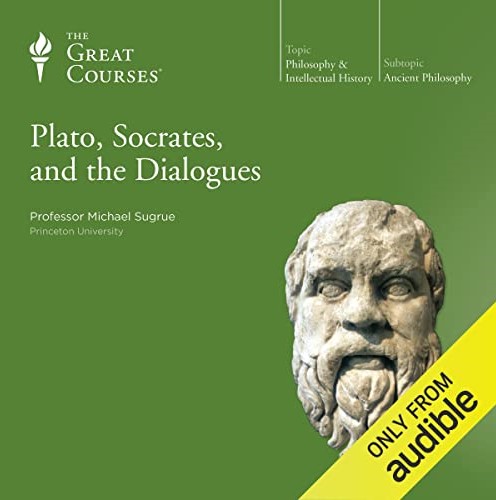
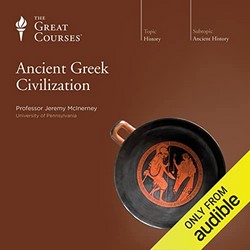
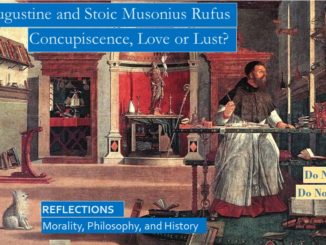
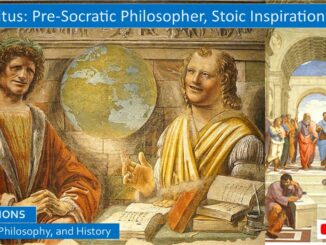
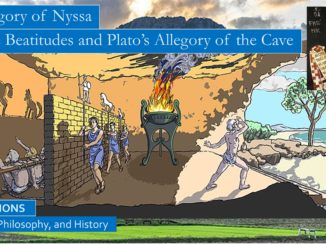
4 Trackbacks / Pingbacks